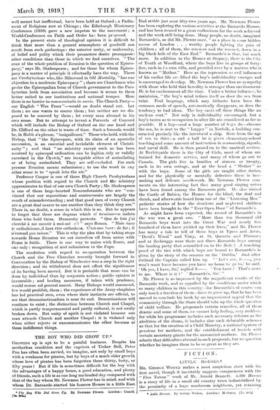THE BOY WHO DID GROW UP.*
GROWIRG up is apt to be a painful business. Despite his motherless condition and the caprices of Tinker Bell, Peter Pan has often been envied, we imagine, not only by small boys with a weakness for pirates, but by boys of a much older growth whose love of pirates has been forgotten these thirty, forty, or fifty years I But if life is sometimes difficult for the boy with the advantages of a happy home, a good education, and plenty of friends, such a life is as one long unclouded day compared with that of the boy whom Mr. Newman Flower has in mind, and with whom Dr. Bernardo started his famous Homes in a little East
• The Boy Who Did Gros. Up. By Newman Blower. Lawton; Cassel/ Ott noel
End stable just over fifty-two years ago. Mr. Newman Flower has been exploring the various activities at the Bernardo Homes, and has been mused to a great enthusiasm for the work achieved and the work still being done. Many people, no doubt, imagined Bernardo's, as did Mr. Flower once, " as a place in some hidden recess of London . . . worthy people lighting the pain of children ; all of them, the rescuers and the rescued, down in a big black hole of the East End." Barnardo's is that, but much more. In addition to the Homes at Stepney, them is the City of Youth at Woodford, where the boys live in groups of forty- five, each in its own villa, and presided over by a matron who is known as "Mother." Here as the repression or evil influences of his earlier life are lifted the boy's individuality emerges and is encouraged to develop. Mr. Newman Flower Inas no sympathy with those who hold that heredity is stronger than environment. He is for environment all the time. Under a better influence, he maintains, " the boy's mind refines itself as does the sea from taint. Foul language, which may hitherto have been the common mode of speech, automatically disappears, so does the tendency to bad ideas. The boy casts off these things like an unclean coat." Not only is individuality encouraged, but a boy's tastes as to occupations in after life are considered as far as possible. If a boy—and a large number of bays do—chooses the sea, he is sent to the " Lugger" in Norfolk, a building con- etructed precisely like the interior of a ship. Here from the age of ten to thirty n and o half he is given elementary-school teaching and some amount of lust, section in seamanship, signals, and naval drill. He is then passed on to the nautical section. At Barkingside there is the City of Girls, most of whom arc trained for domestic service, and many of whom go out to Canada. The girls live in families of sixteen or twenty, each in its own cottage, and at the head a " Mother " as with the boys. Some of the girls are taught office duties, and for the physically or mentally defective there is lace- making and delicate needlework. Mr. Newman Flower com- ments on the interesting fact that many good singing voices have been found among the Bernardo girls. He also visited the Castle of Babies, the Homes for the blind, the deaf and dumb, and afterwards heard from one of the "Listening Men" pathetic stories of how the destitute and neglected children have been brought to the " Ever Open Door" of Bernardo's.
As might have been expected, the record of Barnardo's ins the war was a great one. "More than ten thousand old Bernardo boys went into the Great War and nearly use hundred of them have yielded up their lives," and Mr. Flower has many a tale to tell of these boys at Ypres and Arras, "Devil's Wood" and Vimy, at St. Quentin and Pennine; and at Zeebrugge were there not three Bernardo boys among the landing party that scrambled on to the Mole ? A touching proof of the ties with which boys are bound to Barnardo'14 is givens by the story of the seaman on the Dublin: Just after Jutland the Captain called him up. " Let's see, 8--, you won't want leave because you have no home to go to,' he said. ' Oh yes, I have, Sir,' replied 5---. You have ? That's news to me. Where is it " Bernardo's, Sir.'" Mr. Flower is so impressed by the magnificent results of the Bernardo work, and so appalled by the conditions under which so many children in this country—for Barnardo's of course can only touch a fraction of them—have to grow up, that he has been moved to conclude his book by an impassioned appeal that the community through the State should take up the whole question of child welfare. He propounds certain remedies, all of them drastic and sonic of them, we cannot help feeling, very reckless; for while his programme includes such necessary reforms as the abolition of the slums, it includes also such debatable schemes as that for the creation of a Child Ministry, a national system of pensions for mothers, and the establishment of hostels with certain monetary grants for the unmarried mothers. Mr. Flower admits that difficulties abound in such proposals, but we quest ion whether ho imagines them to be so great as they are.


































 Previous page
Previous page